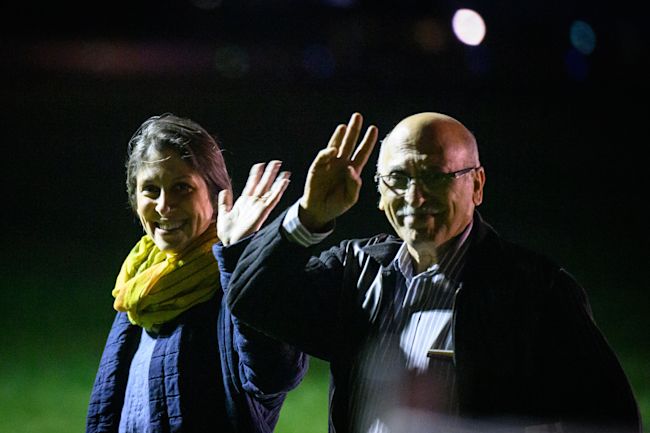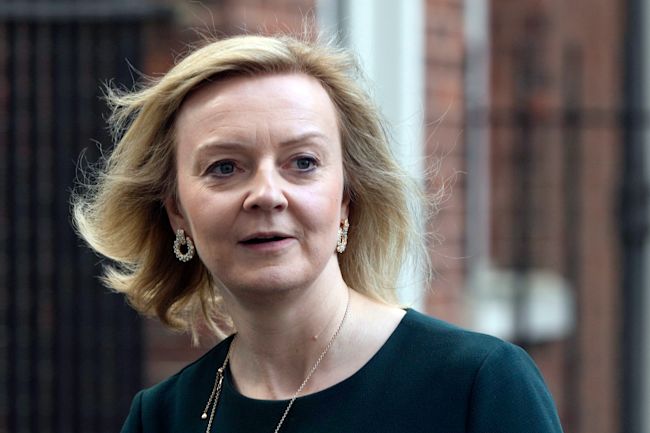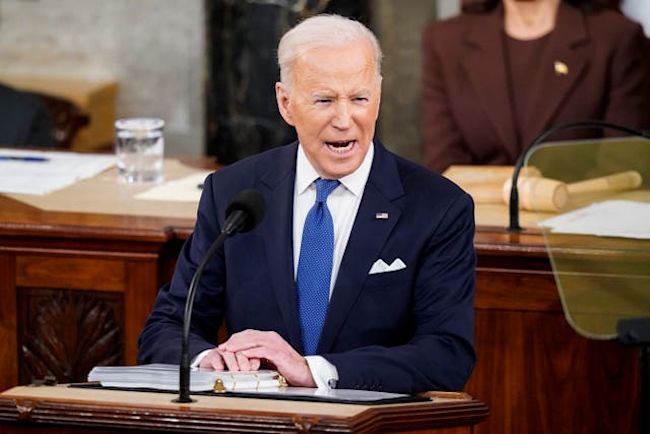Why now? Trump, Biden and the real reason for Nazanin Zaghari-Ratcliffe's release
Anushka Asthana
Deputy Political Editor
The UK has long known that Nazanin Zaghari-Ratcliffe’s detention was wrapped together with a decades-old debt.
I remember speaking to her husband, Richard, in 2021, about his decision to first use the word “hostage”.
“Yes. She always has been a hostage. It took us a bit of time to realise it. It took us a bit of time to say it. It felt a very heavy word, and a brave word,” he told me on the Guardian’s Today in Focus Podcast.
“It took me a while to realise I would have to use the word first.”
By then it had dawned on Ratcliffe that his wife wasn’t a mistaken prisoner, but a pawn in a geopolitical struggle dating back to the 1970s, when Iran paid the UK £400 million for tanks that were then never delivered.
British wildlife conservationist released from Iran jail after Nazanin freed
Zaghari-Ratcliffe’s detention almost half a century later – like that of Anousheh Ashouri – was effectively state-sponsored hostage taking, but also, the debt was a genuine one. And one that it is now clear, we were always willing to pay.
So, given that we have found a way to bypass American sanctions and hand over the money, why didn’t we do it much earlier?
Some speak of oil, others about a change of administration in Iran.
But the experts I speak to point in another direction. Not east to Iran, but west to America and the even more significant change in leadership there.


Anushka Asthana
Deputy Political Editor

The UK has long known that Nazanin Zaghari-Ratcliffe’s detention was wrapped together with a decades-old debt.
I remember speaking to her husband, Richard, in 2021, about his decision to first use the word “hostage”.
“Yes. She always has been a hostage. It took us a bit of time to realise it. It took us a bit of time to say it. It felt a very heavy word, and a brave word,” he told me on the Guardian’s Today in Focus Podcast.
“It took me a while to realise I would have to use the word first.”
By then it had dawned on Ratcliffe that his wife wasn’t a mistaken prisoner, but a pawn in a geopolitical struggle dating back to the 1970s, when Iran paid the UK £400 million for tanks that were then never delivered.
British wildlife conservationist released from Iran jail after Nazanin freed
Zaghari-Ratcliffe’s detention almost half a century later – like that of Anousheh Ashouri – was effectively state-sponsored hostage taking, but also, the debt was a genuine one. And one that it is now clear, we were always willing to pay.
So, given that we have found a way to bypass American sanctions and hand over the money, why didn’t we do it much earlier?
Some speak of oil, others about a change of administration in Iran.
But the experts I speak to point in another direction. Not east to Iran, but west to America and the even more significant change in leadership there.

Nazanin Zaghari-Ratcliffe and Anousheh Ashoori have been reunited with their families after years of detention in Iran.
“The Trump administration insisted on maximum pressure on Iran – the Biden administration has turned that to maximum diplomacy,” said Dr Tobias Borck, research fellow at the Royal United Services Institute, who specialises in Middle East security.
After all, Biden was the vice-president in the Obama administration that first took the US, along with the UK and others, into the nuclear deal with Iran (or the Joint Comprehensive Plan of Action). Under the accord, Iran would limit its sensitive nuclear activities in return for the lifting of crippling economic sanctions.
Trump pulled America out of that deal and reimposed sanctions, and other signatories – including the UK, France, and Germany – were unable to find a way to maintain a deal without America. Since his inauguration, Biden has wanted to put it back in place.
“The Trump administration insisted on maximum pressure on Iran – the Biden administration has turned that to maximum diplomacy,” said Dr Tobias Borck, research fellow at the Royal United Services Institute, who specialises in Middle East security.
After all, Biden was the vice-president in the Obama administration that first took the US, along with the UK and others, into the nuclear deal with Iran (or the Joint Comprehensive Plan of Action). Under the accord, Iran would limit its sensitive nuclear activities in return for the lifting of crippling economic sanctions.
Trump pulled America out of that deal and reimposed sanctions, and other signatories – including the UK, France, and Germany – were unable to find a way to maintain a deal without America. Since his inauguration, Biden has wanted to put it back in place.

'The Biden administration sees engagement with Iran as largely positive and desirable'
Credit: Jabin Botsford/Pool/AP
So, what has this got to do with Nazanin? Well, the shift in administration in the US reopened negotiations, and in doing so, thawed relations between Iran and the West. Diplomacy around hostages wasn’t directly linked to that, but it was another increasingly positive discussion that was taking place alongside it.
Now, progress on the nuclear deal stalled because one key signatory is Russia – and its decision to invade Ukraine significantly complicated the situation. Borck said there are now fears in the US that completing the nuclear deal will give Russia a backdoor, via Iran, to avoid its sanctions. That leaves the US in a difficult position with Iran, but it doesn’t, and didn’t, stop the UK pushing ahead with its progress over hostages.
And the foreign secretary, Liz Truss, could complete the jigsaw, in part, because of the muted reaction she knew it would get from a United States under a different leader.
“It is very clear that under a Trump administration, making a deal like this would have been significantly harder for the UK – simply because – you can imagine Trump’s response to us giving this money to Iran.
"While the Biden administration sees engagement with Iran as largely positive and desirable,” added Borck.
That is not to say that other factors are not important. Truss pointed to the change in administration in Iran in 2021, from the more reformist figure of Hassan Rouhani, to the more conservative Ebrahim Raisi. Why would that help?
Some say that he was more able to complete a deal like this because there was no pressure to prove his conservative credentials.
Then there is the question of Truss herself. I’m told by civil servants that she has a laser-like determination to get things done. They say that can make her challenging to work for – but it can also mean results.
So, what has this got to do with Nazanin? Well, the shift in administration in the US reopened negotiations, and in doing so, thawed relations between Iran and the West. Diplomacy around hostages wasn’t directly linked to that, but it was another increasingly positive discussion that was taking place alongside it.
Now, progress on the nuclear deal stalled because one key signatory is Russia – and its decision to invade Ukraine significantly complicated the situation. Borck said there are now fears in the US that completing the nuclear deal will give Russia a backdoor, via Iran, to avoid its sanctions. That leaves the US in a difficult position with Iran, but it doesn’t, and didn’t, stop the UK pushing ahead with its progress over hostages.
And the foreign secretary, Liz Truss, could complete the jigsaw, in part, because of the muted reaction she knew it would get from a United States under a different leader.
“It is very clear that under a Trump administration, making a deal like this would have been significantly harder for the UK – simply because – you can imagine Trump’s response to us giving this money to Iran.
"While the Biden administration sees engagement with Iran as largely positive and desirable,” added Borck.
That is not to say that other factors are not important. Truss pointed to the change in administration in Iran in 2021, from the more reformist figure of Hassan Rouhani, to the more conservative Ebrahim Raisi. Why would that help?
Some say that he was more able to complete a deal like this because there was no pressure to prove his conservative credentials.
Then there is the question of Truss herself. I’m told by civil servants that she has a laser-like determination to get things done. They say that can make her challenging to work for – but it can also mean results.

Civil servants say Foreign Secretary Liz Truss 'has a laser-like determination to get things done'
But what about oil? Some have pointed out that Iran could be an option in selling far more oil in the face of so much of the world trying to pivot away from Russia. It is true that this could happen, but ultimately that relies not on the UK, but on the US, and its return to the nuclear deal. Only that would limit the sanctions that currently prevent Iran from taking action here.
Shadow Foreign Secretary David Lammy said the return of Zaghari-Ratcliffe and Ashouri was "wonderful" but did not ease concerns over Iran's actions.
“[Iran] continues to unjustly detain other British and foreign nationals, support extremist groups across the region, its hard-line government pays little regard for the human rights of Iranians, and it retains an active nuclear and ballistic missile programme," he said.
He warned against "short-termist shifts to other authoritarian states" and said the UK needs to move away from fossil fuels and "onto clean, cheap, homegrown renewables instead".
For Zaghari-Ratcliffe and others, this huge geopolitical wrangle has meant years of their lives lost to a tragedy that everyone hopes they can slowly rebuild from.
But what about oil? Some have pointed out that Iran could be an option in selling far more oil in the face of so much of the world trying to pivot away from Russia. It is true that this could happen, but ultimately that relies not on the UK, but on the US, and its return to the nuclear deal. Only that would limit the sanctions that currently prevent Iran from taking action here.
Shadow Foreign Secretary David Lammy said the return of Zaghari-Ratcliffe and Ashouri was "wonderful" but did not ease concerns over Iran's actions.
“[Iran] continues to unjustly detain other British and foreign nationals, support extremist groups across the region, its hard-line government pays little regard for the human rights of Iranians, and it retains an active nuclear and ballistic missile programme," he said.
He warned against "short-termist shifts to other authoritarian states" and said the UK needs to move away from fossil fuels and "onto clean, cheap, homegrown renewables instead".
For Zaghari-Ratcliffe and others, this huge geopolitical wrangle has meant years of their lives lost to a tragedy that everyone hopes they can slowly rebuild from.
No comments:
Post a Comment